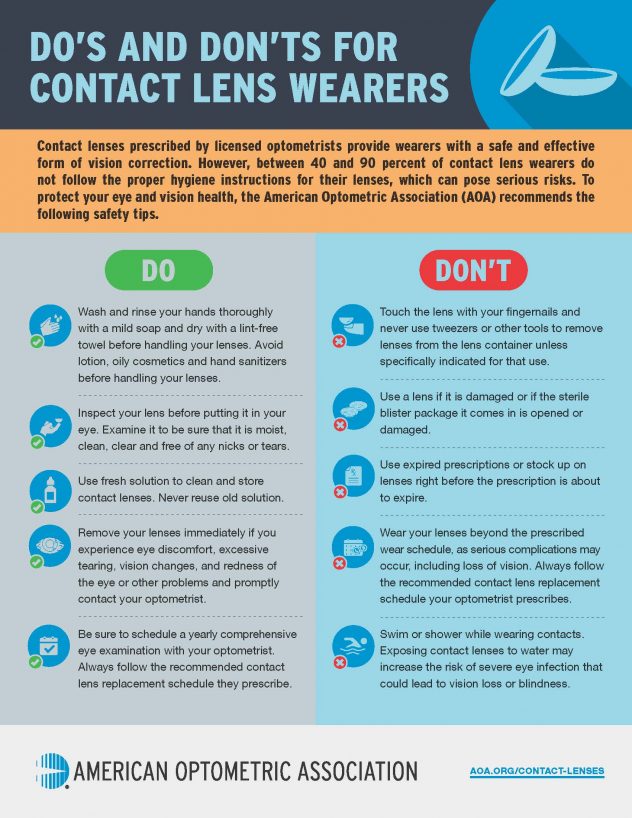
While contact lenses provide many vision benefits, they are not risk free. To raise awareness of healthy contact lens practices, the American Optometric Association (AOA) is partnering with the Centers for Disease Control and Prevention (CDC) to promote Contact Lens Health Week, August 20th-24th.
Contact lens-related eye infections and other injuries can lead to long-lasting damage but often are preventable. Clean and safe handling of contacts is one of the easiest and most important measures patients can take to protect their vision. Many common care mistakes, including failing to clean and store lenses as directed by a doctor of optometry and sleeping while wearing contacts, can increase the chance of getting bacteria in the eyes and causing infection. Serious eye infections can lead to blindness and affect up to one out of every 500 contact lens users per year, and even minor infections can be painful and disrupt day-to-day life.
All contact lenses, even purely cosmetic ones, are classified as medical devices by the U.S. Food and Drug Administration (FDA) and require a valid prescription. They must be properly fitted and prescribed by a doctor of optometry. Purchasing contact lenses without a prescription from third-party vendors, such as online retailers and novelty shops, can also put consumers at risk. While decorative contact lenses are often considered a fashion accessory, they pose the same potential safety and health issues as corrective lenses. Illegally-purchased lenses can cause bacterial infections, allergic reactions and even significant damage to the eye’s ability to function.
We would like to offer the following recommendations for contact lens wearers to maintain safe and healthy eyes:
- Always wash and thoroughly dry your hands before handling contact lenses.
- Carefully and regularly clean contact lenses as directed by your optometrist. Rub the contact lenses with your fingers and rinse them thoroughly before soaking the lenses overnight in multipurpose solution that completely covers each lens.
- Store lenses in the proper lens storage case, and replace the case at least every three months.
- Use only products recommended by your optometrist to clean and disinfect your lenses.
- Use only fresh solution to clean and store contact lenses. Never reuse old solution.
- Always follow the recommended contact lens replacement schedule your optometrist prescribes.
- Remove contact lenses before swimming or entering a hot tub.
- Never use expired prescriptions or stock up on lenses right before the prescription is about to expire.
- See your optometrist for your regularly scheduled contact lens and eye examination.
